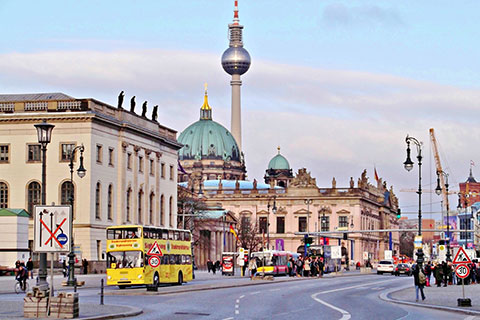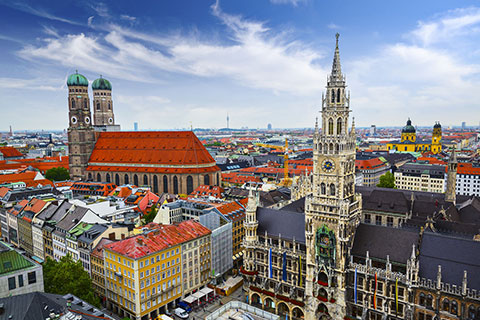
Study in Germany
Last edited on 14 Feb 2026
Welcome to Germany!
The Federal Republic of Germany lies in the heart of Europe. It is a cosmopolitan, democratic country with a rich tradition as well as a vibrant modern life. Germany is one of the world’s strongest economies and offers an innovative research and education landscape. At the same time, it has a dynamic cultural scene. Germany is the European Union’s most populous nation with over 83 million inhabitants. It is surrounded by nine neighboring countries, and its territory encompasses roughly 357,000 square kilometres - stretching from the North Sea and the Baltic Sea in the north to the Alps in the south. Since 1949 the Federal Republic of Germany has been a democratic parliamentary federation. It is made up of 16 Länder (federal states), each with its own constitution, parliament and government. Germany is a modern and open-minded country with high quality of life, influenced in many ways by multinational diversity. Berlin is the capital of Germany.
Germany is a country characterized by variety. Trendy and modern Berlin can seem a world away from the more traditional and conservative Munich. The gleaming skyscrapers of Frankfurt form a stark contrast to quaint Heidelberg. And if bustling and fast-paced Hamburg becomes too much, you can always retreat to the peaceful and picturesque Middle Rhine region.
Higher Education System
In Germany there are around 400 institutions of higher education*, of which 121 are entitled to award doctorates, and around 203 universities of the applied sciences. Courses at German Higher Education Institutions cover more than 400 disciplines, and many institutions offer courses taught in English that lead to internationally recognized degrees, including Master’s and PhD. Prominent fields of study include: Engineering Sciences, Natural Sciences, Economics and Business Administration, Arts, Music, Architecture and Design – and there are over 2,300 international programs*, most of them taught in English, listed on the DAAD database. Almost half of Germany’s 2.9 million current students are women. With around 360,000 foreign students* enrolled at German institutions of higher education, Germany has the fifth highest number of foreign students in the world. The number of Indonesian students in Germany has decreased due to coronavirus pandemic. Currently there are around 5.000 Indonesians studying in Germany*. Germany offers various forms of research locations: All in all, there are approximately 1.000 public-funded research institutions in Germany, plus research and development centres run by industrial corporations. The annual research budget is about 110 billion euro (www.research-in-germany.org). German universities do not charge tuition fees, neither from German nor from the international students.
(*Data Sources: www.hochschulkompass.de, www.destatis.de, DAAD International Programs Database, Wissenschaft Weltoffen Kompakt 2024)
Universities in Germany
Student Cities in Germany
Berlin

Berlin is Germany’s capital city with 3.5 million inhabitants. This metropolis never sleeps. Berlin is home to internationally renowned universities, large corporations and start-up companies. With 60 research facilities and more than 40 institutions of higher education, Berlin offers an extremely broad range of academic and research opportunities. 200,000 people from around the world study and work in the city.
Top universities in Berlin include four ranked within the world's top 200 in the QS World University Rankings® 2021; these are Humboldt-Universität zu Berlin (ranked joint 117th), Freie Universität Berlin (joint 130th) and Technische Universität Berlin (joint 148th).
Munich

Thanks to its world-famous Oktoberfest (a huge annual beer festival), Munich will forever be associated with Germany’s beer-brewing tradition. But there’s more to this southern German city, which is often voted one of the world’s most livable cities. For one thing, Munich is home to the two highest ranked universities in Germany: Technische Universität München – ranked 50th in the world, and Ludwig-Maximilians-Universität München, ranked joint 63th in the world.
A sleek modern financial hub, Munich can be a little on the pricey side. But it won’t cost you anything to enjoy the beautiful Bavarian countryside which surrounds it. There’s plenty of history to enjoy too, and no visit to München would be complete without a visit to King Ludwig’s palaces and grottos.
Heidelberg

Despite being part of one of Germany’s most densely populated areas, Heidelberg manages to retain a certain quaint rustic charm. It’s popular with tourists, who come to see its ancient castle and red-roofed town center. Top universities in Heidelberg include the famous Ruprecht-Karls-Universität Heidelberg, which is Germany’s oldest and third-highest ranked university (ranked 64nd in the world). It boasts connections with more than 50 Nobel Prize winners, of whom 10 were (or are) professors at the university.
Cologne

Cologne is known for its dramatic cathedral, Kölner Dom, its pleasant riverside, and its liberal and tolerant nature. It has a vibrant student community, is peppered with museums and art galleries, and does a good line in beer halls and independent stores, particularly in the Agnesviertel district. Direct trains run to Paris, Brussels and Amsterdam, and Luxembourg isn’t too far away either, so Cologne could be a good choice for those keen to explore Western Europe. Universities in Cologne include the flagship Universität Köln (University of Cologne), ranked joint 282nd in the world, which is Germany’s largest and second-oldest university.
Frankfurt

The beating heart of Germany’s financial and business sectors, Frankfurt is also the home of the European Central Bank. Accordingly, its city center is a mass of gleaming skyscrapers, and its airport is the busiest in continental Europe. However, it’s not all work and no play. Frankfurt is known for offering some of the best nightlife in Germany and hosts a number of colorful festivals throughout the year. As for universities in Frankfurt, the most prestigious is Johann Wolfgang Goethe-Universität Frankfurt am Main, ranked joint 311st in the world, and particularly strong in social science subjects.
Application, Fees and Visas in Germany
Tuition fees in Germany
If you wish to study in Germany at undergraduate level, great news! There are almost no tuition fees at most public universities in German for undergraduate students, and this includes domestic, EU and international students except in Baden-Württemberg. Starting winter semester 2017/2018, universities in Baden-Württemberg charge tuition fees of 1.500 euros per semester for foreign students.
While tuition costs are free, however, students are required to pay a nominal fee per semester of around €250 (~US$280). This fee covers administration, student support and other costs.
If you want to study in Germany at master’s level, you may need to pay tuition fees. This is usually only the case for students who have not completed a related bachelor’s program at a university in Germany within the past few years – classed as “non-consecutive” students. Fees for non-consecutive master’s degrees vary, but can amount to as much as €10,000 (~US$11,100) per semester.
If you plan to progress from undergraduate study in Germany straight to a related master’s program at a public university, fees are likely to remain low or non-existent. To find out more, read our article about the costs of studying in Germany.
Scholarships
Study scholarships for STEM disciplines - DAAD - Deutscher Akademischer Austauschdienst
Focus Scholarship: Master in STEM Disciplines
Competition: Designated Country: Africa, Latin America, and Southeast Asia
Scholarship Coverage: Full Scholarship
The programme offers a Master’s scholarship in the field of Mathematics, computer science natural sciences and engineering (STEM). The aim of the scholarship programme is to support the qualification and employability of young academics and future professionals from developing and emerging countries.
Unlike EPOS scholarship programme, you can apply for this scholarship scheme if you are a fresh graduate with no work experience. It is also necessary to choose a tuition-free Master's programme, and funding cannot be granted for a Master's programme that has already started in Germany.
Criteria
- academic achievements
- course of studies
- knowledge of the language(s) of instruction or working language(s)
- if applicable, relevant internships, work experience
- Latest university degree not more than 6 years prior to the scholarship application
- Not stayed in Germany for more than 15 months at the time of application
Living Cost
From the winter semester 2024/25 onwards, the presumed annual requirement that must be paid into the blocked account when applying for a visa amounts to 11.904 euros.
Work
For those who come from EU countries, Iceland, Liechtenstein, Norway or Switzerland, they may work as much as they’d like without any additional permit. However, like German students, they should not work more than 20 hours a week during the lecture period. For those who come from countries not mentioned before, they are only allowed to work up to 140 full days or 280 half days in a year.
Applying to Universities in Germany
The application process for universities in Germany varies depending on a few factors. If you have a European qualification, such as a baccalaureate or A-levels, then you will only need to prove you can speak German (unless you’re enrolling in a course taught in English) and you can then apply directly for a university-level course.
Students with qualifications from outside Europe may have to take the Feststellungsprüfung (a qualification assessment examination). They can prepare for this examination in a Studienkolleg (a foundation course or a preparatory class).
For most subjects, you can apply directly to the international office of the university. Alternatively, you can use uni-assist, a centralized admissions portal for international students. This is one of the services run by the German Academic Exchange Service (DAAD), the world’s largest funding organization supporting international student and academic mobility.
For some subjects, there is a nationwide cap on the number of students who can enroll. For these subjects (mostly life sciences), students from the EU (plus Norway, Iceland or Liechtenstein) need to apply through the Foundation of Higher Education Admission. Students from outside the EU should apply in the normal manner.
Getting a student visa for Germany
The requirements to get a student visa for Germany depend on your country of origin.
Applicants from the EU (and Norway, Iceland, and Liechtenstein)
You do not need a visa to study in Germany.
Within two weeks of your arrival you must register with the Einwohnermeldeamt or Bürgeramt (resident’s registration office) in your city. You’ll need your registration document from your university for this..
If required the Foreigners Office (Ausländerbehörde) will issue a Freedom of Movement certificate for EU-citizens.
You will need to prove you have or will have enough money (see above) and have purchased statutory health insurance. Certain countries have bilateral agreements with Germany, which mean insurance policies in the student’s home country will be applicable in Germany.
You need to prove your proficiency in your course’s language of instruction.
Applicants from outside the EU
If you are from Australia, Canada, Israel, Japan, South Korea, New Zealand, Switzerland or the US, you will not need a visa to enter the country, but you will need to register at the local Residents’ Registration Office and the Aliens’ Registration Office (Ausländeramt) to obtain a residence permit (Aufenthaltserlaubnis).
If you are from Andorra, Brazil, El Salvador, Honduras, Monaco, San Marino or Taiwan you will only need a student visa for Germany if you want to work before or after your degree. You will need to apply for a residence permit.
If you are from any other country, you will need to obtain a visa from your nearest German embassy before you enter Germany, as well as a residence permit. Ensure that you apply for a National Visa for the purpose of study rather than a Schengen Visa, which will only allow you to stay in Germany for three months.
In order to get a residence permit you will need to present confirmation that you’ve registered at the Residents’ Registration Office, proof that you have health cover (your university will help with this), proof of your financial means, your passport (with visa if you need one) and a tenancy agreement which shows you have found somewhere to live. It will be valid for two years, after which time you must get it renewed.
To obtain a visa, you will need to present the same list of documents as for a residence permit. You may also have to show proof that you don’t have a criminal record and are free of certain diseases. The specific list will depend on the embassy.
The same language requirements apply as specified in the requirements for EU students. You may also need to produce this evidence at the visa stage.
Fast fact
- Area: 357,022 sq km (slightly smaller than Japan)
- Population: 83 million – second largest in Europe, after Russia
- Borders with: France, Poland, Czech Republic, Denmark, the Netherlands, Luxembourg, Belgium and Austria
- Capital and largest city: Berlin
- Official language: German
- Federal republic split into 16 states, known as Länder
- Germany has the world’s fourth largest GDP
- There are no speed limits on German motorways (autobahn)
- Central European Time (UTC+1), switching to Daylight Saving Time in summer (UTC+2)
- International dialing code: +49
- Currency: Euro (€)
- Influential member of the European Union
- Famous for beer brewing, Christmas markets and bratwurst (sausage made from pork, beef or veal)
- Famous dead Germans include classical music composers Bach, Beethoven and Brahms, and philosophers Kant, Hegel, Schopenhauer and Nietzsche.
Non-official useful links
- http://www.studying-in-germany.org/ -- contains detailed information about Studying in Germany
- http://www.germany-visa.org/student-visa/ -- contains detailed information about Germany Student Visa and requirements
- https://www.study-in-germany.de/en/plan-your-stay/job-and-career/working-opportunities-in-germany-after-graduation_71971.php - contains some info about alumni and possibility to work in respective country
Discover the land of ideas, Germany! The country today becomes one of the main gate ways for many students to pursue their education in Europe. As the most populous country in the European Union, you must agree that it is a cosmopolitan and tolerant country.
Revolutionary inventions, they called? Here is where it came from: the automobile, the airbag, X-ray technology, Aspirin, the computer, the chip card and the MP3 data compression format. Science and research have a long tradition in Germany and are still highly valued today. Therefore, government and independent organization of German higher education institutions (DAAD) support the mobility of international students to Germany. DAAD or so called German Academic Exchange Service responsible for implementing internationalization as well as establishing foreign cooperation.
Helmut-Schmidt-Programme: Master’s Scholarships for Public Policy and Good Governance (PPGG)
Focus Scholarship: Master
Competition: Designated Country: Africa, Latin America, South Asia and Southeast Asia, Middle East countries
Scholarship Coverage: Full Scholarship
This program is designed to further qualify future leaders in politics, law, economics, social sciences, and public administration according to the principles of Public Policy and Good Governance and to prepare them in a praxis-oriented course for their professional life. Different from EPOS, you are welcome to apply for this program if you are a Bachelor graduate without professional experience. Besides, Mid-career professionals are also invited to apply.
Criteria
- Academic achievements
- English and German proficiency
- additional political and social engagement
- Highly motivated proven by a convincing description of the subject-related and personal motivation for the study project in Germany and the expected contribution to the home country.
- Latest university degree not more than 6 years prior to the scholarship application
- Not stayed in Germany for more than 15 months at the time of application
Development-Related Postgraduate Courses (EPOS)
Focus Scholarship: Master and PhD
Competition: Developing Countries
Scholarship Coverage: Full scholarship
A scholarship program for Postgraduate courses focusing on professionals from developing countries to study at German Higher education institutions. This program is funded by the Federal Ministry for Economic Cooperation and Development
Criteria
- Hold a Bachelor degree in an appropriate study program
- Have at least two years" professional experience
- Passionate in development-related field and be expected to take on social responsibility, initiate, and support processes of change in their personal and professional environment after their training/scholarship
Doctoral degree & Post Doc scholarship programs
Focus Scholarship: PhD, Post Doctoral
Competition: worldwide
Scholarship programs available as a financial aid to support Doctoral degree & Post Doc candidates. In the detail below you could find the program offered for all field of study and some program specifically based on thematic fields (NAWAM, Biodiversity & Health).
Criteria
- Master degree should not have any longer than six years (2010)
- Letter of Acceptance from Professor/ Supervisor
- Letter of Admittance from German University
- Proof of existing contacts to the Professor/ Supervisor of the doctoral programme (E-Mail)
- Research Proposal which has been approved by Professor/ Supervisor
- Research Schedule which has been approved by Professor/ Supervisor (3 years)
- Master degree with min. 3,0
- TOEFL IBT min. 80 or IELTS min. 6.0 and it must be taken within the last two years
- German language proficiency if it is required











